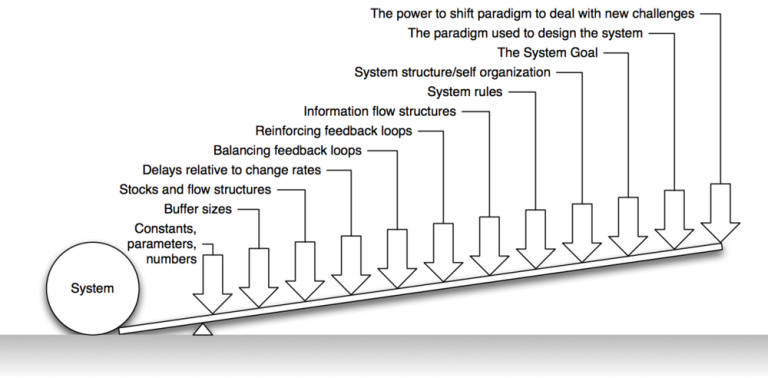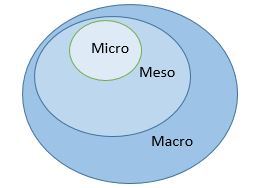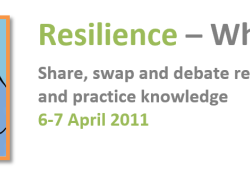Boingboing blogs from… the Resilience Forum!
Complex systems theory and practice – Phil Haynes, Brighton Resilience Forum – Thursday 19 January 2017
by Josie Maitland, PhD student and Boingboinger
Phil started the session by acknowledging the range of experience and expertise in the room. He shared his desire to learn alongside the group and not just impart knowledge.
Phil said that systems theory, which is abstract meta-theory, can be difficult to understand and apply to practice. Collective sigh of relief from those who had attempted some prior reading that they were not alone in their struggle! Phil gave some background about how he came to be professor of public policy with an interest in organisation and macro issues, having qualified and practiced as a social worker specializing in addiction and probationary work.
Just a few minutes into the session there was a strong sense of practice and theory merging together. In describing systems we are trying to understand how we as individuals think and behave as well as how we operate as part of organisations and as a society. Ultimately, for many in the room, this is not just an exercise in describing but a precursor to prescribing or intervening in the system to bring about positive change. This created a buzz of excitement as people were keen to get their head around some of the complex theory so that they could begin to apply a systems lens to their own work.
Background theory
Phil ran us through some systems background, explaining how systems theory emerged from the natural sciences and has more recently been applied to social sciences. He also explained a little about each of the ‘systems VIPs’ (including Von Bertalanffy, Durkheim, Luhmann, Meadows, Cilliers and Byrne). As Phil acknowledged, we can think of systems as ranging from micro (our own brains and thought processes constitute a system), to meso (relationships, families, organisational systems) and macro (economic and policy/political systems):
We then considered strengths and weaknesses of a systems approach, focusing on the debate about whether this abstracted and value-free meta theory can be useful in practice to challenge reductionism, merge theory and practice and offer a synthesized or holistic understanding of social systems.
Equifinality
Phil put a slide up on the projector that showed:
A + B = Y
A + E = Y
B + D = Y
For a moment I panicked, reverting straight back to GCSE maths lessons and expecting a board rubber to be launched in my direction by a displeased teacher any second. Thankfully, Phil wasn’t about to embark on an algebra tutorial, he was asking us to identify the pattern in these equations. Luckily a bright spark (needless to say not me) piped up and showed that A or B always lead to Y. Phew!
Phil explained that whilst systems theory has no singularity, different patterns can be identified; in what is called ‘equifinality’, there is not total chaos, but some underlying trends that we can explain, meaning that different causes sometimes lead to the same outcome.
When applied to research it is important that, due to the complexity of human interaction and multiple potential explanations, research is repeated over time. Time can offer us a sort of reassuringly reliable base from which to guestimate particular outcomes. Phil used the analogy of weather reporting and explained that rather than using more sophisticated tools or taking more precise measurements, improved accuracy of the weather reporting comes from better historical tracking of patterns. This, to be honest, was a sore spot for me considering the disappointing lack of snow which did not arrive as forecast the previous week, proving Phil’s analogy was a good one – we can predict with some accuracy, but not certainty.
Cilliers
In an overview of Cilliers work on complex systems, Phil differentiated between ‘complicated’ mechanical systems and ‘complex’ interactive systems. Whilst the complicated mechanical system of an aeroplane can be predictably operated without human control, the complex interactive system of the airport contains human interaction and is therefore much more unpredictable – as evidenced by the 8 hour delay I once experienced in a Greek airport due to my lost luggage.
In these complex interactive systems, there are multiple cases (people), elements (physical objects), with both reinforcing (+) and checking (-) feedback influencing patterns of interaction. These complex systems are relatively open with dynamic flows of energy and are partly defined by their history.
Systems change/instability
In systems theory, change is episodic not linear. This means that there could be significant change, then no change for some time. As Phil discussed, this means that whatever system we are referring to, there is always some instability in the system, but the degree will vary. Phil said that the instability is often quickly corrected by other factors that bring back equilibrium. He questioned whether this could be equated with the protective factors of resilience. When a system reaches a tipping point of instability and corrects itself, is it resilient? One practitioner proposed the notion that by defining resilience as stability, we are not considering the systems that maintain stability but are not producing fair or healthy outcomes. Good point.
It was then time for a discussion in small groups about the application of systems theory in our research projects, practice and work places, as well as considering the links between resilience and systems theory. The room came to life with vibrant discussion and debate from topics ranging far and wide from weather reporting to the state of the National Health Service. When conversations joined up, we focused on the self-organisation of systems. Was it always positive for a system to be stable?
We considered what happens when a system is resistant to change and how this resistance manifests. When people behave in similar ways over time due to cultural and societal ‘stickiness’ (historical path dependency), over time the system as a whole becomes stuck and can become trapped in a cycle of conservative self-organisation that keeps the system stable but unhealthy. One example was given of the education system, which would be said to be a stable and well-functioning system, but which persists in reproducing inequality. The opposing approach involves innovative and creative action based initiatives that seek to change the system from within (such as the systems based Academic Resilience Approach) fostering dissipative self-organisation.
We also discussed tipping points for organisational systems, a critical shift in the overall dynamic brought about by activity at one or more levels (individual, organisation, macro/society). As an example, one group proposed that the NHS as a system has reached a tipping point due to a combination of too much feedback/checking (one health care professional noted that the amount of checking procedures increased workload but not wellbeing or efficiency), lack of resources, and staffing issues.
Kahneman/cognitive systems
Phil moved on from overall systems theory to looking specifically at personal systems of thinking – or cognitive systems. He introduced us to the work of Daniel Kahneman (2012) a Nobel prize winner for economics who proposed that we have two cognitive systems, one which is not rational or reflective, that deals with feelings, values, assumptions and is immediate and intuitive, and one that deals with rational, deliberate and consciously reflective thought. Whilst most of the group (myself included) were silently going through the checklist on the slide and doing a bit of self-reflection, one switched on practitioner critiqued the theory as too simplistic, can we really say that our feelings are not rational in many cases? Surely these two systems interact and feedback to each other?
As Phil suggested, cognitive insight of this kind can help initiate conversations in which we better understand ourselves and our subsequent behaviour, but what about large scale pressures from external systems?
This is where the resilience research from our Brighton University research group really got triggered in my mind. We can’t individualise resilience because it responsibilises individuals and shifts blame away from the inequitable structure of society that is hugely influential for health and wellbeing determinants, especially for those most disadvantaged groups. In my own research focusing on schools, it is not good enough to say, for example, that children from families of lower socio-economic status do not do as well as their peers in education. We must interrogate the ways in which the education system itself contributes to or reinforces existing inequalities and challenge these structures so that these children do better than expected, which may in turn challenge the inequalities of later health and life outcomes.
Phil’s own examples included those who had done extensive cognitive self work, only to experience a sudden catastrophe in their meso system (family, relationships, organisations that support them) that undid all their cognitive hard work immediately.
Phil referred to the Resilience Framework as a blend of considering the personal, relational and organisational systems that contribute to resilience for the individual, thus requiring an understanding of how organisational systems themselves operate.
A complex organisational system has communication at its heart and will also involve roles, tasks, power and links (both informal and formal). The organisation is, at once, dependent (on funding for example), interdependent (e.g. health and social care) and independent (with its own context, culture, structure and strategies). Phil referred to John Seddon (Systems Thinking in the Public Sector, 2014) who highlights the issue of ‘demand failure’ and the need for systems to prioritise ‘relational experience’. In other words, making sure those who need the services receive them, and not just ‘doing things to people’ but working towards a coproduction of output or coproducing the improvement of systems.
Again this hit home with a core principle of Boingboing, underpinning much of our work, which is that more efficient and sustainable change can occur in systems when more stakeholders are meaningfully positioned as co-evaluators, co-designers and co-producers. Breaking down the hierarchies of power that exist in traditional approaches to system improvement involves both an empowering process of involvement for all stakeholders, but also the production of knowledge and implementing of new practice that is superior, both in terms of congruence to need and sustainability.
Phil told us about the University of Birmingham Business School who suggest that complex solutions are not good ways to deal with complex situations, rather they are counterproductive. For this reason, clarifying and simplifying systems will help. Many practitioners echoed agreement, particularly from health and education, giving examples of bureaucratic procedures detracting from relational aspects of the service and overcomplicating but not improving service.
Phil said that many services are interested in the idea of ‘adding value to the process’, ie adding value with what we already have rather than introducing new resources. This could, in the view of both the researchers and practitioners on my table, be both a positive and a dangerous denial of necessary resources.
We discussed the newly introduced ‘Mental Health’ first aid training for schools. Does this add value? As one practitioner identified, schools have certainly reached a ‘tipping point’ with staff already on their knees who are now expected to deliver more support for students for which they are undertrained. There is a danger, the practitioner suggested, that this is too simplistic a solution. Of course, there might be added value for students, which is a positive step, but there hasn’t been consideration of the decreased wellbeing of staff in the process, which will of course feedback into student experience in other ways. For more information about the Academic Resilience Approach (ARA), which aims to improve resilience across the whole school community and in doing so improve outcomes for the most disadvantaged, please check out the ARA resources.
In summary
The session was remarkable in that the content and vibrant discussions certainly provided a cerebral workout and stimulated food for thought, whilst the breadth of applied relevance to so many different fields of practice gave us plenty of ‘gems’ to take back to our own research and practice. Huge thanks to Phil for this brain tingling overview of the most complicated of ideas presented with engaging and transferrable clarity.



